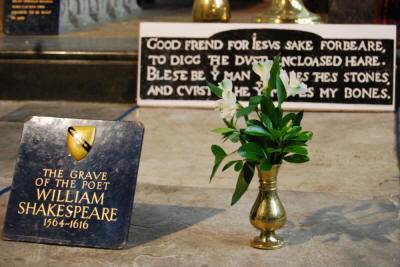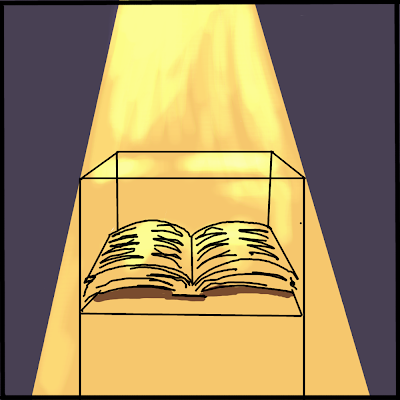For
my graduation present, my grandma, my aunt, and I went to England. We ranged in
age from 75 to 21, and our social, political, and moral stances varied
similarly. As did our bedtimes.
I
spent much of the time trying not to look like a tourist. This was made
particularly difficult because Grandma is a big fan of maps. Maps of London,
tube maps, bus maps, maps of special sections of town. She carried them with
her and pulled them out every few blocks.
I
did what I could to make her look like a local. At a crucial moment, I talked
her out of a fanny pack.
She
got a single strap backpack instead, which was much less conspicuous.
Eventually
I gave up on disguising us. Instead, I tried to migrate the trip to quaint
places outside of London where being a tourist would have some novelty value.
Grandma was intent on taking me to Stratford-upon-Avon to see Shakespeare.
Aunt
and I both dreaded this part of the trip, because Stratford-upon-Avon
collects tourists like Disney World.
“Look,”
we said, “we made friends in Gloucester! Let’s stay.”
But
it was no use. She was determined that I needed to see Shakespeare. I felt
stereotyped as an English major and suckered into a tourist trap.
Sure
enough, the whole town seemed to have invested in Shakespeare’s name. Every
shop had bobble heads, quotes, stuffed Shakespeare dolls. The streets milled
with Germans, Americans, visiting Englishmen, and Scots. All the buildings,
even the ones erected in the last twenty years, had been designed to resemble the
seventeenth century. It felt like Busch Gardens.
Grandma
took me to Shakespeare’s birthplace and nudged me in. Aunt advised that I
should accept this gift, despite the £16 charge, for the sake of Grandma’s
feelings.
They
made you go through a few rooms with odd relics of Shakespeare’s past and a few
dramatic videos full of quotes—just a trick to control the volume of people visiting the birthplace. I had this particular session to myself, so I sullenly sat in
the handicapped section and watched impassively. I moved through the timed doors one by one as I edged closer to Shakespeare's first home.
Then,
all of a sudden, the video faded and a light shone on a pedestal in front of
me. “It is thanks to this collection of folios compiled by actors that
Shakespeare’s work has been preserved.”
I
stumbled forward so fast the handicap chair was still folding back up by the time I
reached the pedestal. I got close enough to fog the glass, trying to absorb as much of that page of Richard III as I could in the twenty seconds left on the video.
I tremblingly toured the birthplace, trying to play it cool in front of all the nice interpreters.
I tremblingly toured the birthplace, trying to play it cool in front of all the nice interpreters.
After
my tour, an actress named Charlotte gave me a personal performance of Hamlet's to be or not to be soliloquy. She perched on the edge of a fountain and I think she channeled Shakespeare for a moment there, since I thought not about Hamlet's dilemma, but Shakespeare's own fear of mortality and the beyond.
Shaken and a little stirred (emotionally), I retired for the day, happy with my findings but ready to get back to some less touristy areas.
The next morning, Grandma announced we were going to church. I’d forgotten it was Sunday. Time is relative over there, anyway, since the sun sets at 9:30. Grumblingly, I attended the Holy Trinity Church with Aunt and Grandma.
Afterwards, I retreated to the cemetery with Aunt while Grandma socialized. After ages of waiting for Grandma to finish making friends, she came out with a middle aged woman.
“We have something to show you,” Grandma said. I followed the two back into the church, and the woman walked us past a rope barrier some members of the church were putting up.
And then I saw it. Shakespeare’s grave.
The
woman watched me, waiting for my pleased response and probably a thank you.
Instead, for the first time in years, I cried in public.
For
all my talk, Grandma was right. I wasn’t too cool for Shakespeare.














